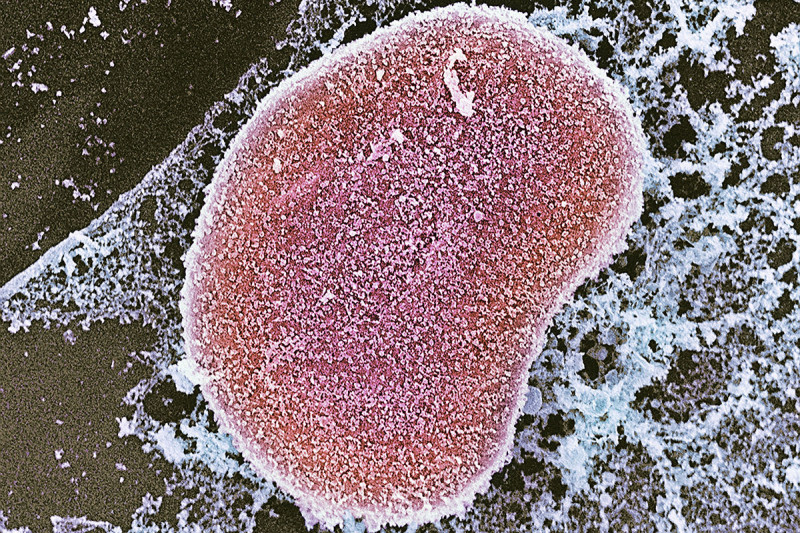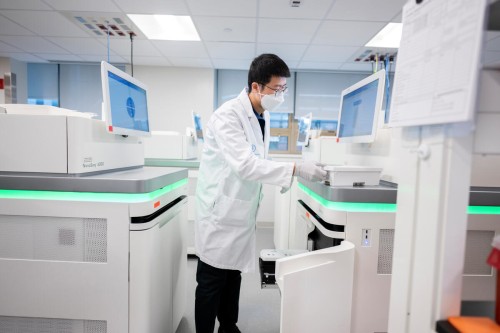How an Altered Gatekeeping Protein Can Cause Cancer

Cancer is caused by gene mutations, but sometimes it’s hard to figure out which mutations actually drive tumor growth and which are just along for the ride. One way to determine this is to look for so-called mutational hot spots. These areas of the genome are mutated in tumors more frequently than would be expected by chance. The frequency suggests that they may play an active role in cancer.
MSK-IMPACTTM, Memorial Sloan Kettering’s diagnostic test that looks for genetic changes in more than 400 genes in patients’ tumors, has proven quite useful in the discovery of new hots pots. Researchers in the Human Oncology and Pathogenesis Program (HOPP) have used the identification of one particular hot spot to explain why a gene called XPO1 causes cancer. The findings were published online July 8 in Cancer Discovery.
“Researchers already knew that XPO1 regulates which proteins are located in a cell’s nucleus and which get moved to the cytoplasm. This is a basic function for any cell,” says senior author Omar Abdel-Wahab, a physician-scientist in HOPP. “But until now, nobody has ever shown how the alteration of the XPO1 protein could cause cancer. This study shows how this happens.”
Decoding the Function of an Important Protein
XPO1 is often mutated in blood cancers — especially many types of lymphoma. XPO1 mutations are also found in some solid tumors. A drug that targets these mutations, called selinexor (Xpovio®), was recently approved by the US Food and Drug Administration for the treatment of multiple myeloma. It is being tested in clinical trials for other cancers at several institutions, including MSK. But researchers weren’t sure which patients were most likely to respond to the drug.
An analysis of MSK-IMPACT data led by study co-author Barry Taylor, a computational oncologist and Associate Director of the Marie-Josée and Henry R. Kravis Center for Molecular Oncology, suggested that a specific mutation in XPO1, called E571, was common in cancer. To study the function of that particular mutation, Dr. Abdel-Wahab’s team put a version of the gene with the E571 mutation into mice. The mice developed cancer at a high rate. The researchers then did additional studies in the mice and in human cancer cells to find out how the mutation causes cancer.
“We found that the mutant form of XPO1 promoted excessive cell growth,” says first author Justin Taylor, an MSK medical oncologist and member of Dr. Abdel-Wahab’s lab. “Further analysis showed that this occurs because of XPO1’s role as a gatekeeper that regulates which proteins can exit the nucleus.” The researchers found that mutations affect the function of this gate, changing which proteins stay in the nucleus and which leave and go to the cytoplasm.
Dr. Taylor adds that the research also revealed why the drug is effective. “The mutation changes the electrical charge of the XPO1 protein, which makes selinexor bind to it more strongly. This makes the cancer cells more prone to die.”
Developing a More Personalized Approach
Clinical trials for selinexor are ongoing. Currently, MSK is participating in a trial for people with liposarcoma. The results of a trial for people with myelodysplastic syndrome were presented at a recent meeting of the American Society of Hematology.
Dr. Abdel-Wahab says that the E571K mutation may prove to be an effective way to determine who is likely to benefit from selinexor. This could influence future clinical trials of the drug and lead to a more personalized approach to who gets the drug.
The researchers also plan to study the role of other XPO1 defects in cancer, including cases where the gene is overexpressed but not necessarily mutated.








